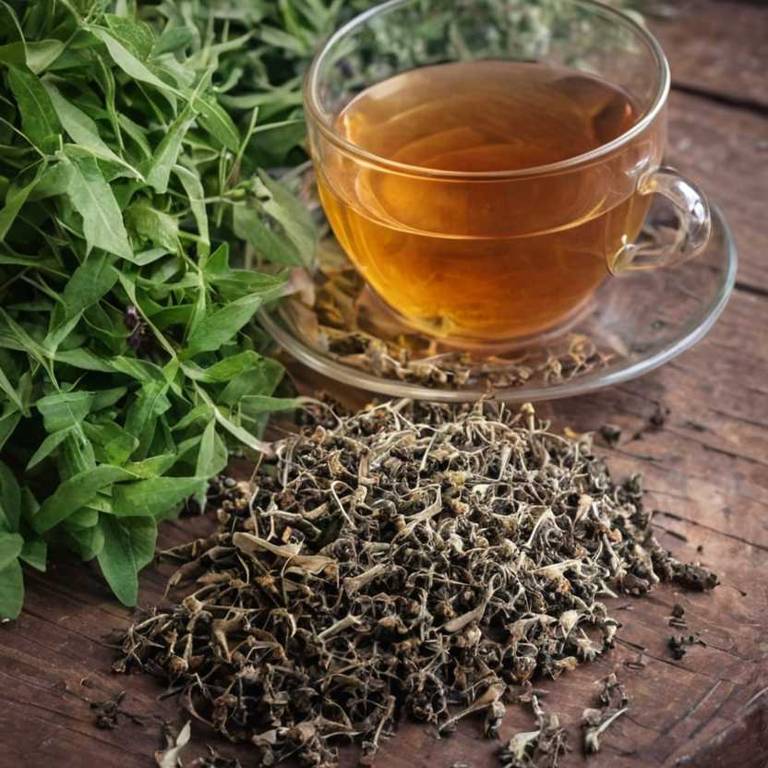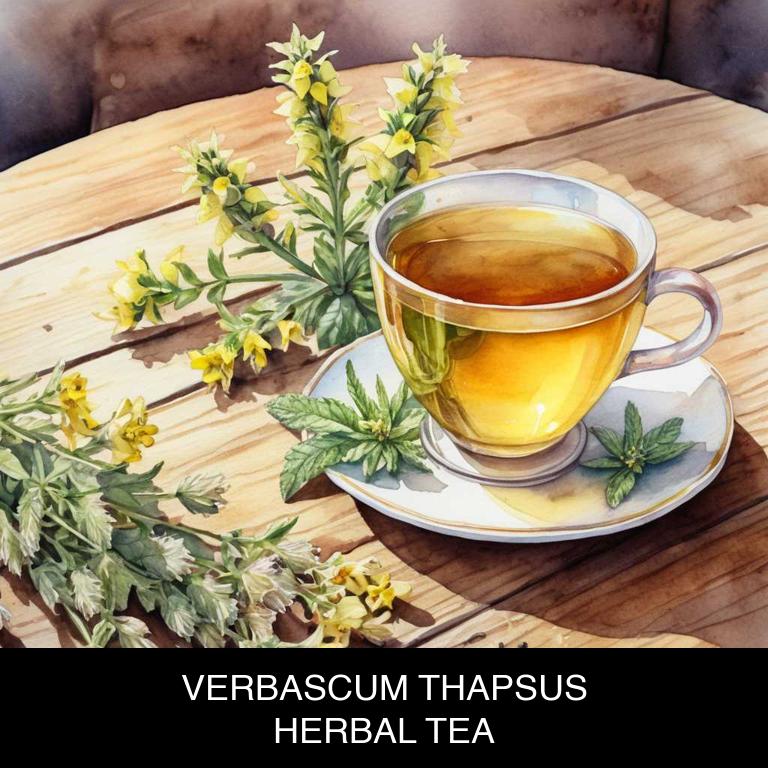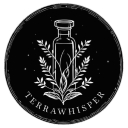
By Leen Randell
Updated: Nov 13, 2024
10 Best Herbal Teas For Dry Cough

Herbal teas for dry cough are natural remedies that help to soothe and calm dry, irritated throats, providing relief from persistent coughing.
The best herbal teas for dry cough include Thymus vulgaris, Echinacea purpurea, Glycyrrhiza glabra, Eucalyptus globulus, Mentha x piperita, Zingiber officinale, Verbascum thapsus, Sambucus nigra, Lavandula angustifolia, and Rosmarinus officinalis.
If left untreated, dry cough can disrupt daily life, causing fatigue, sleep deprivation, and strain on the vocal cords, ultimately affecting overall well-being and productivity.
1. Thymus vulgaris
Thymus vulgaris teas helps with dry cough because it contains compounds like thymol and carvacrol, which have antimicrobial and anti-inflammatory properties.
These properties help in reducing inflammation in the throat, thus relieving dry cough. Additionally, thymol has expectorant properties, which help in loosening mucus and promoting its expulsion from the body. By soothing the throat and loosening mucus, Thymus vulgaris teas provides relief from dry cough, making it a popular natural remedy for this common condition.
Its anti-inflammatory properties also help in reducing congestion.

Medicinal Constituents
The list below shows the primary medicinal constituents in Thymus vulgaris teas that help with dry cough.
- Thymol: Acts as an expectorant, helping to loosen and clear mucus from the airways, thereby reducing the severity of dry cough.
- Carvacrol: Exhibits anti-inflammatory properties, reducing inflammation in the throat and airways, which can contribute to dry cough.
- Rosmarinic acid: Possesses antimicrobial properties, helping to combat infections that can cause dry cough, such as respiratory tract infections.
Parts Used
The list below shows the primary parts of Thymus vulgaris used to make teas for dry cough.
- Leaves: Thyme leaves are the most commonly used part for tea, as they contain the highest concentration of thymol, an antiseptic compound that helps relieve coughs and soothe the respiratory system.
- Flowers: Thyme flowers are also used to make tea, as they contain a high amount of essential oils, which provide a soothing and calming effect on the respiratory tract, helping to ease dry coughs.
- Stems: Thyme stems are sometimes used to make tea, particularly when leaves are not available, as they still contain some essential oils and compounds that can help to ease dry coughs and promote respiratory health.
2. Echinacea purpurea
Echinacea purpurea teas helps with dry cough because its anti-inflammatory properties help soothe and calm the irritated mucous membranes in the throat.
The tea's expectorant properties also help loosen and clear out mucus, making it easier to cough up. Additionally, Echinacea purpurea has been shown to have immunomodulatory effects, which can help boost the body's natural defenses against respiratory infections that often cause dry coughs.
This combination of properties makes Echinacea purpurea tea a popular natural remedy for dry cough relief.

Medicinal Constituents
The list below shows the primary medicinal constituents in Echinacea purpurea teas that help with dry cough.
- Iridoide glycosides: These compounds have anti-inflammatory properties, which help to reduce inflammation in the throat and alleviate dry cough.
- Alkylamides: Alkylamides have immunomodulatory effects, enhancing the body's natural defense against infections that can cause dry cough.
- Cichoric acid: Cichoric acid has anti-inflammatory and antiviral properties, which help to soothe the throat and reduce the severity of dry cough.
Parts Used
The list below shows the primary parts of Echinacea purpurea used to make teas for dry cough.
- Flowers: They are used due to their high content of phenolic compounds and glycosides, which have anti-inflammatory and immune-boosting properties.
- Roots: They contain echinacosides and alkylamides, which have been shown to have anti-inflammatory and antiviral properties that help alleviate dry cough.
- Leaves: They are used due to their rich content of flavonoids and phenolic acids, which have antioxidant and anti-inflammatory properties that help soothe dry cough.
3. Glycyrrhiza glabra
Glycyrrhiza glabra teas helps with dry cough because of its soothing and anti-inflammatory properties.
The licorice root, a key ingredient in these teas, contains compounds like glycyrrhizin and flavonoids that help to calm the throat and reduce inflammation. This leads to a reduction in coughing and a decrease in irritation, allowing the body to recover from the underlying condition causing the dry cough.
The antiviral and antimicrobial properties also help to combat infections that may be contributing to the cough.

Medicinal Constituents
The list below shows the primary medicinal constituents in Glycyrrhiza glabra teas that help with dry cough.
- Licorice saponins: These saponins possess anti-inflammatory properties, which help reduce inflammation in the throat and airways, thereby alleviating dry cough symptoms.
- Glycyrrhizin: As a natural expectorant, glycyrrhizin helps loosen and clear mucus from the airways, making it easier to cough up and reducing the severity of dry cough.
- Flavonoids: The flavonoids present in Glycyrrhiza glabra teas possess antioxidant and anti-inflammatory properties, which help soothe the mucous membranes, reduce inflammation, and provide relief from dry cough.
Parts Used
The list below shows the primary parts of Glycyrrhiza glabra used to make teas for dry cough.
- Roots: Used to make teas due to its high glycyrrhizin content, which has anti-inflammatory properties that help soothe dry cough.
- Leaves: Used to make teas because of their gentle and soothing effects, which can help calm the throat and provide relief from dry cough.
- Flowers: Used to make teas due to their mild sweetness and soothing properties, which can help reduce inflammation and provide comfort for dry cough sufferers.
4. Eucalyptus globulus
Eucalyptus globulus teas helps with dry cough because its active compounds, such as eucalyptol and cineole, have potent expectorant properties.
These compounds help to loosen and clear mucus from the airways, making it easier to cough up and relieve congestion. Additionally, eucalyptus oil has anti-inflammatory effects that soothe the throat and calm irritation, reducing the urge to cough.
As a result, eucalyptus globulus teas provide natural relief for dry coughs, promoting relaxation and easier breathing.

Medicinal Constituents
The list below shows the primary medicinal constituents in Eucalyptus globulus teas that help with dry cough.
- Cineole: Acts as a bronchodilator, helping to open up airways and reduce inflammation in the lungs, thereby relieving dry cough symptoms.
- Bornyl acetate: Exhibits expectorant properties, helping to loosen and clear mucus from the airways, making it easier to cough up and relieving dryness.
- Α-pinene: Displays antitussive properties, helping to reduce the urge to cough by suppressing the cough reflex and providing relief from dry cough.
Parts Used
The list below shows the primary parts of Eucalyptus globulus used to make teas for dry cough.
- Leaves: They are the most commonly used part for tea due to their high eucalyptol content, which helps to relieve respiratory issues and ease congestion.
- Barks: The bark of Eucalyptus globulus is also widely used for its medicinal properties, particularly for its ability to soothe sore throats and coughs.
5. Mentha x piperita
Mentha x piperita teas helps with dry cough because its expectorant properties help loosen and clear mucus from the airways, reducing congestion and coughing.
The menthol in peppermint tea also has a soothing effect on the throat, reducing inflammation and discomfort. Additionally, mentha x piperita's natural anti-inflammatory compounds may help alleviate coughing caused by irritation in the throat.
By promoting a healthy respiratory system and relieving throat irritation, mentha x piperita teas can provide quick relief from dry cough symptoms.

Medicinal Constituents
The list below shows the primary medicinal constituents in Mentha x piperita teas that help with dry cough.
- Menthol: Menthol acts as a natural expectorant, helping to loosen and clear mucus from the airways, thereby providing relief from dry cough.
- Limonene: Limonene has anti-inflammatory properties, which can help reduce inflammation in the throat and airways, making it easier to breathe and alleviating dry cough symptoms.
- Rosmarinic acid: Rosmarinic acid exhibits antimicrobial properties, which can help combat infections that may be causing the dry cough, promoting a faster recovery and relief from symptoms.
Parts Used
The list below shows the primary parts of Mentha x piperita used to make teas for dry cough.
- Leaves: The leaves are the most commonly used part, as they contain high concentrations of menthol and menthone, which help to relieve dry cough symptoms.
- Stems: The stems are also used, as they have a higher menthol content than the leaves and contribute to the tea's expectorant properties.
- Buds: The buds are used due to their high menthone content, which aids in loosening and removing mucus from the respiratory tract, providing relief from dry cough.
6. Zingiber officinale
Zingiber officinale teas helps with dry cough because of its natural anti-inflammatory and expectorant properties.
The active compounds in ginger, such as gingerols and shogaols, help to break down mucus and reduce inflammation in the throat and lungs. This makes it easier to cough up mucus and provides relief from dry, hacking coughs. The warming sensation of ginger also helps to soothe the throat and calm irritation, providing a comforting and natural remedy for dry coughs.
This makes ginger tea a popular choice for cough relief.

Medicinal Constituents
The list below shows the primary medicinal constituents in Zingiber officinale teas that help with dry cough.
- Gingerols: These compounds have anti-inflammatory properties, which help to reduce inflammation in the throat and airways, alleviating dry cough symptoms.
- Shogaols: Shogaols have expectorant properties, which help to loosen and clear mucus from the lungs, making it easier to cough up and relieving dry cough.
- Phenolic acids: These compounds have antioxidant and anti-inflammatory properties, which help to protect the throat and airways from damage caused by free radicals and inflammation, reducing the severity of dry cough.
Parts Used
The list below shows the primary parts of Zingiber officinale used to make teas for dry cough.
- Rhyzomes: The rhizomes of Zingiber officinale are used to make teas for dry cough because they contain compounds like gingerol and shogaol, which have anti-inflammatory properties that help soothe the throat and reduce coughing.
- Roots: The roots of Zingiber officinale are used to make teas for dry cough because they are rich in pungent compounds that help break down mucus and ease congestion.
- Leaves: The leaves of Zingiber officinale are used to make teas for dry cough because they contain volatile oils that help relieve respiratory issues and provide temporary pain relief.
7. Verbascum thapsus
Verbascum thapsus teas helps with dry cough because of its expectorant properties that loosen and clear mucus from the airways.
The tea's mucilage content forms a protective barrier on the respiratory tract, soothing irritated tissues and reducing inflammation. This helps to break down and expel mucus, providing quick relief from dry coughs. Additionally, the tea's anti-inflammatory properties further reduce coughing, making it an effective natural remedy for dry coughs.
Its soothing effects calm the throat and chest, promoting a faster recovery.

Medicinal Constituents
The list below shows the primary medicinal constituents in Verbascum thapsus teas that help with dry cough.
- Verbascoside: Verbascoside exhibits expectorant properties, helping to loosen and clear mucus from the airways, thereby alleviating dry cough symptoms.
- Iridoid glycosides: Iridoid glycosides in Verbascum thapsus teas have anti-inflammatory and soothing effects on the mucous membranes, reducing irritation and discomfort associated with dry cough.
- Triterpenoids: Triterpenoids in the plant have been found to have an antitussive (cough-suppressing) effect, helping to relieve dry cough by reducing the frequency and severity of coughing episodes.
Parts Used
The list below shows the primary parts of Verbascum thapsus used to make teas for dry cough.
- Leaves: The leaves of Verbascum thapsus are used to make teas for dry cough because they contain expectorant and mucolytic properties that help relieve cough.
- Flowers: The flowers of Verbascum thapsus are used to make teas for dry cough because they possess anti-inflammatory and soothing properties that calm the throat.
- Roots: The roots of Verbascum thapsus are used to make teas for dry cough because they contain demulcent properties that soothe and protect the mucous membranes.
8. Sambucus nigra
Sambucus nigra teas helps with dry cough because it contains bioflavonoids and anthocyanins, which have anti-inflammatory properties that help soothe the throat and reduce swelling.
The tea also has antimicrobial properties that combat infections and promote healing. Additionally, Sambucus nigra is rich in vitamin C, which boosts the immune system and helps fight off the underlying cause of the cough.
By addressing the root of the issue, Sambucus nigra teas provide effective relief from dry, persistent coughs.

Medicinal Constituents
The list below shows the primary medicinal constituents in Sambucus nigra teas that help with dry cough.
- Phenolic acids: Help with dry cough by exhibiting anti-inflammatory properties, reducing swelling in the throat and airways, and easing coughing.
- Flavonoids: Assist in alleviating dry cough by possessing mucolytic properties, breaking down mucus and phlegm, and facilitating easier expulsion from the respiratory tract.
- Tannins: Contribute to the relief of dry cough by acting as astringents, reducing inflammation and congestion in the throat, and providing a soothing effect.
Parts Used
The list below shows the primary parts of Sambucus nigra used to make teas for dry cough.
- Flowers: The flowers of Sambucus nigra are used due to their high anthocyanin and flavonoid content, which have anti-inflammatory and antitussive properties that help soothe a dry cough.
- Leaves: The leaves of Sambucus nigra are used for their expectorant properties, which help loosen and clear mucus from the respiratory tract, providing relief from a dry cough.
- Fruits: The fruits of Sambucus nigra are used due to their high content of sambunigrin, a compound that helps reduce inflammation and relieve a dry cough.
9. Lavandula angustifolia
Lavandula angustifolia teas helps with dry cough because of its soothing and anti-inflammatory properties.
The tea contains flavonoids and terpenes, which have been shown to relax the muscles in the throat and airways, reducing inflammation and congestion. Additionally, the tea's calming effects can help to reduce coughing spasms, making it easier to breathe and sleep. This natural remedy has been used for centuries to alleviate dry cough symptoms and promote overall respiratory health.
Its gentle and non-irritating nature makes it a popular choice for those seeking relief from dry cough.

Medicinal Constituents
The list below shows the primary medicinal constituents in Lavandula angustifolia teas that help with dry cough.
- Linalool: Helps to reduce inflammation and relax the airway muscles, making it easier to cough up mucus and relieve dry cough symptoms.
- Linalyl acetate: Exhibits expectorant properties, helping to thin and loosen mucus, making it easier to expel and relieving dry cough.
- Caryophyllene: Acts as an anti-inflammatory agent, reducing inflammation in the airways and relieving dry cough symptoms, while also exhibiting antimicrobial properties to prevent infections.
Parts Used
The list below shows the primary parts of Lavandula angustifolia used to make teas for dry cough.
- Leaves: The leaves of Lavandula angustifolia are used to make teas for dry cough because they contain volatile oils that have anti-inflammatory properties.
- Flowers: The flowers of Lavandula angustifolia are used to make teas for dry cough because they are rich in essential oils that have expectorant and soothing effects.
- Stems: The stems of Lavandula angustifolia are used to make teas for dry cough because they contain flavonoids and terpenes that may help reduce inflammation and soothe the throat.
10. Rosmarinus officinalis
Rosmarinus officinalis teas helps with dry cough because of its expectorant properties, which help loosen and clear mucus from the lungs, relieving congestion and discomfort.
The essential oils present in rosemary, such as camphor and borneol, have anti-inflammatory properties that soothe the throat and airways, reducing irritation and discomfort associated with dry cough.
Additionally, rosemary's natural antiseptic properties help combat underlying infections that may be contributing to the cough, promoting overall respiratory health.

Medicinal Constituents
The list below shows the primary medicinal constituents in Rosmarinus officinalis teas that help with dry cough.
- Rosmarinic acid: This phenolic compound helps with dry cough by exhibiting anti-inflammatory properties, which reduces inflammation in the respiratory tract and relieves cough symptoms.
- Carvacrol: This monoterpene helps with dry cough by acting as an expectorant, thinning mucus and making it easier to cough up, thereby providing relief from cough.
- Cineole: This monoterpenoid helps with dry cough by exhibiting antitussive properties, suppressing cough reflex and reducing the frequency and severity of cough episodes.
Parts Used
The list below shows the primary parts of Rosmarinus officinalis used to make teas for dry cough.
- Leaves: They are the most commonly used part due to their high concentration of antioxidants and essential oils that help soothe and calm the throat.
- Flowers: They are a popular choice for their fragrant and aromatic properties, which can help relieve dry cough and promote relaxation.
- Stems: They are often used in combination with leaves to create a more robust and effective tea for dry cough relief.
